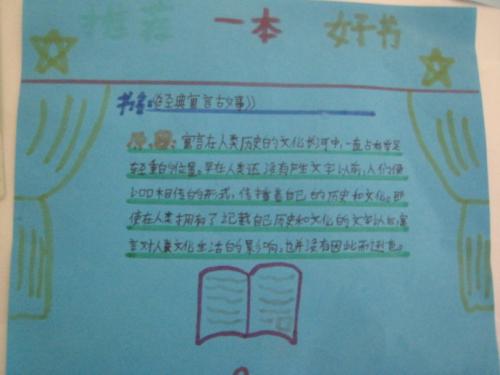2015年6月英语六级翻译冲刺练习及答案(6篇)
毕业论文评语-转正
2015年6月英语六级翻译冲刺练习及答案(6篇)
1、中国神话故事
尽管中国古代神话(mythology)没有十分完整的情节,神话人物也没有系统的家谱
(genealogy),但它们却有着鲜明的东方文化特色,其中尤为显著的是它的尚德精神(the
spirit of esteeming virtue)。这种尚德精神在与西方神话特别是希腊神
话比较时,显得更加突
出。在西方神话尤其是希腊神话中,对神的褒贬标准多以智慧、力量为准则,而中
国古代
神话对神的褒贬则多以道德为准绳。这种思维方式深植于中国的文化之中。几千年来,这
种尚德精神影响着人们对历史人物的品评与现实人物的期望。
译文:
Although ancient Chinese mythology does not have
relatively complete plot and
mythological
figures don't have systematic genealogy, they have
distinct features of oriental
culture, among
which the spirit of esteeming virtue is
particularly compared with
Western mythology,
especially Greek mythology, this spirit of
esteeming virtue is even more
Western
mythology, especially Greek mythology,the criteria
for judging whether a
god is good or not are
mostly the god's wisdom and strength,while in
ancient Chinese mythology,
the criterion lies
in morality. This way of thinking is deeply rooted
in Chinese
thousands of years, this spirit of
esteeming virtue has affected people's comments on
historical
figures and expectations of real
people.
2、敬茶礼仪
当今社会,客来敬茶已经成为人们日常社交和家庭生活中
普遍的往来礼仪。俗话说:酒
满茶半。上茶时应以右手端茶,从客人的右方奉上,并时带微笑。当然,喝
茶的客人也要
以礼还礼,双手接过,点头致谢。品茶时,讲究小口品饮,其妙趣在于意会而不可言传。<
br>另外,可适当称赞主人茶好。总之,敬茶是国人礼仪中待客的一种日常礼节,也是社会交
往的一项
内容,不仅是对客人、朋友的尊重, 也能体现自己的修养(self-cultivation)。
翻译:
1
Nowadays, offering tea
to guests has becomecommon etiquette in daily
social interaction
andfamily life. As the
saying goes, white spirit, full cup;tea, half cup.
Tea cup should be held on
the righthand and
offered to guests with a smile from theirright
side. Of course,the guests should
pay respect
as well, taking over the cup with bothhands and
nodding to express his thanks. When
tasting
tea,you should drink it in small sips,the beauty
and fun of which is beyond words. In
addition,
you could praise the tea of theowner
appropriately. In short, offering tea is a daily
ritual
of Chinese people when receivingguests
and it is also part of social interaction. It can
not only
show respect to guests andfriends,
but also reflect your self-cultivation.
词汇详解:
1.敬茶:可以理解为“献茶”,故译为offer tea。
2.俗话说:可译为as the saying goes,固定译法。
3.酒满茶半:可译为white spirit,full
cup;tea,halfcup。在中国的餐桌文化里,酒要倒
满,而茶要倒半杯。
4.以礼还礼:可译为pay respect as well。
5.讲究小口品饮:即drink it in small
sips。其中,sip作名词,意为“小口喝”;也可以作动
词,例如Mike sipped
hisdrink quickly.(迈克快速地喝了 一小口饮料。) 词组take a
sip表示
“喝一小口,抿一口。”
6.日常礼节:可译为daily ritual。
7.对客人、朋友的尊重:可译为动词词组,即show respect to guests
and friends。
3、景德镇瓷器
景德镇(Jingdezhen)位于江西省东北部,以瓷器而闻名,历来被誉为中国的
“千年瓷
都”。在景德镇出产的各类瓷器中,尤以青花瓷(blue and white porce
lain)最为突出。清代是
青花瓷的鼎盛时期,景德镇青花瓷以其烧造精致而独占鳌头。新中国成立后
,在景德镇设
立了人民瓷厂(People'sPorcelain Factory)专门生产青花瓷
。景德镇青花瓷造型优美,色彩绚
丽,装饰精美,是景德镇四大传统名瓷之一,素有“永不凋谢的青花”
之称。青花瓷远销世
界各地,受到世界人民的喜爱。
2
翻译:
Jingdezhen,located in the northeast of
JiangxiProvince,is famous for porcelain and is
honored as“home of porcelain for thousands of
years” inChina. Among different types of
porcelain producedin Jingdezhen,blue and white
porcelain is the mostrenowned. Blue and white
porcelain reached its peak in the Qing and
whiteporcelain from Jingdezhen ranked
first
for its fine production. After new China was
founded,People's Porcelain Factory was set up in
Jingdezhen to produce blue and white
porcelainspecially. Blue and white porcelain from
Jingdezhen is elegantly shaped,rich in color
anddelicately decorated. It is one of the four
famous
traditional types of porcelain in
Jingdezhen,and enjoys the reputation of “ever-
green blue and
white porcelain”.Blue and white
porcelainhas been sold to countries all over the
world and is liked
by people around the world.
词汇详解:
1.位于:可译为be located in,也可用lie
in或be situated in等来表达。
2.被誉为:可译为be honored
as,也可译为be praisedas。
3.清代是青花瓷的鼎盛时期:本句可以理解为“青花瓷在清代达到顶峰”,其中
“达到顶
峰”可以用reach its peak表达。
4.专门生产:其中“专门”可译为specially。
5.色彩約丽:即“色彩丰富”,可译为rich in color,也可以用形容词colorful表达。
6.永不凋谢的:可以理解为“常青的”,即ever-green。
4、丁克家庭
中国有一句俗语叫做“不孝有三,无后为大”。但现在,很多时尚的年轻夫妇选择不生
育孩
子的生活方式,组建了丁克家庭。很多夫妻担心无法给孩子提供优越的生活条件,选
择成为丁克家庭。现
在,孩子的教育费用比过去高很多。在大城市,送孩子上好一点的幼
儿园要花费巨资,重点中小学的学费
更高。还有一些夫妻成为丁克家庭是迫不得已。当他
们做好准备生育孩子时,已经错过了最佳生育年龄。
译文:
3
A popular saying
has it that “There are three forms of unfilial
conduct, of which the worst is
to have no
descendants.”But now, it is quite fashionable for
many young couples to choose a
lifestyle
without kids and organize the DINK family. Some
couples who choose DINK family are
fearful
that they cannot provide favourable living
conditions for children. Nowadays, the cost of
educating a child is much higher than that of
the past. In a big city, to send a child to a
better
kindergarten takes a large amount of
money and the key primary or secondary schools are
even
more expensive. Some couples who have
chosen DINK family are obliged to do so. When they
make preparations for having a baby, it is a
pity that they have missed the most fertile years.
翻译词汇:
不孝有三,无后为大。There are three forms
of unfilial conduct, of which the worst is to
have no descendants.
时尚的 fashionable
生活方式 lifestyle
丁克家庭 DINK family
担心 fearful
优越的 favourable
重点中小学 the
key primary or secondary school
迫不得已 be
obliged to do sth.
做好准备 make preparations
for
5、赡养父母
在大家庭里,老一辈人的意见受到尊重,小一辈人得到全家的呵护
。中国宪法规定赡
养父母是成年子女义不容辞的责任。在城市里,不和家里老人一起住的年轻夫妇给老人
提
供生活费并帮助他们干家务活儿。在农村,尽管大家庭解体了,许多结了婚的儿子和他的
家人
还和父母住在同一个院子里。对他们来说,分家不过是分灶而已。结了婚的儿子往往
把房子盖在父母家附
近,这样父母和子女互相帮助、探望都和过去一样方便。
译文:
4
In extended families, the older
members’ opinions are respected, and the youngest
members
are loved and taken good care of by
all. China’s Constitution stipulates that grown-up
children
are duty-bound to support their
parents. In the cities, couples who do not live
with their aged
parents offer them living
allowances and help them with the chores. In the
countryside, though
quite a number of extended
families have dissolved, many married sons and
their families
continue to live in the same
courtyard with their parents. To them, breaking up
the extended
family means only cooking their
meals separately. Most often they have their
houses built near
their parents’ home, making
it convenient for parents and children to help and
visit each other as
before.
翻译词汇:
大家庭 extended family
宪法 Constitution
规定
stipulate
义不容辞的责任 duty-bound
生活费
living allowance
家务活 chore
解体 dissolve
分家 breaking up the extended family
分灶
cook their meals separately
6、歌谣和神话
远在文字
出现之前,歌谣跟口头流传的神话就已大量产生。中国的文学正是开始于
此。不过,歌谣本是人们在生活
中随兴而发的东西,上古时代也没有保存和记载它们的方
式,因此也就很快湮灭,不留痕迹。如今,我们
只能从一些古书中推断它们的存在。古书
中记载了一些年代非常久远的歌谣,但是大多出于后人的伪托,
能够断定出处的歌谣要到
《诗经》里才能看见。从这点来看,古代神话对中国文学的影响更为显著。
翻译词汇:
歌谣 ballad
5
随兴而发 improvise
痕迹 trace
推断 deduce
年代非常久远的 time-honored
伪托 derivative
《诗经》 The Book of Songs
译文:
Long before
the emergence of the written word, ballads and
myths, passed around by word of
mouth, were
widely popular. Chinese literature finds its
origins in these traditions. However,
ballads
were what people improvised out of daily life, and
due to lack of means to record and
preserve
them in ancient times, they quickly disappeared
without leaving much of a trace. Today,
we can
only deduce their existence from ancient books,
which recorded some time-honored
ballads,
though most of these are believed to be
derivatives of later generations. Ballads in The
Book of Songs are the earliest writings that
can be dated. From this point of view, ancient
mythology has had a greater influence on
Chinese literature.
6



